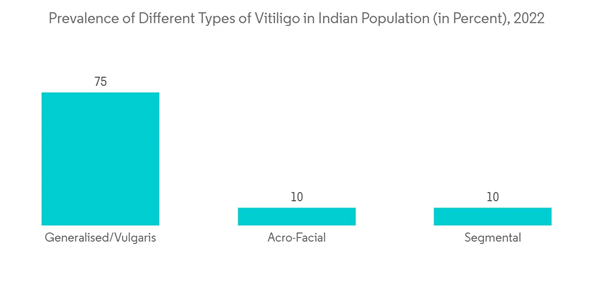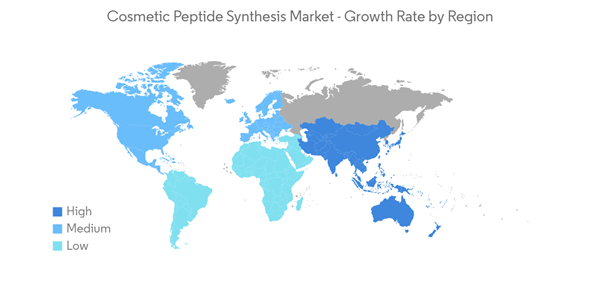COVID-19 had an adverse impact on the cosmetic industry including the cosmetic peptide synthesis industry. For instance, the research study published in October 2021 stated significant differences in cosmetic usage. The article predicted that cosmetic usage would revert back to pre-COVID levels for eye, lip, and skin cosmetics after 1-2 years. Despite that, the United States Cosmetic Industry expected a significant decline in 2020. Similarly, another article published in October 2020 in the International Journal of Eating Disorders titled stated that the study led by researchers from Swinburne’s Centre for Mental Health (CMH) has found that while most people reported spending less time investing in their appearance since COVID-19 began, individuals with high dysmorphic concern continued to feel self-conscious about their appearance. However, the studied market has been recovering over the last two years since the cosmetic peptide synthesis restrictions were lifted. The market will require another 1-2 years to show a stable growth rate.
In addition, the increasing prevalence of eye and skin disorders and increasing research and development activities are actively affecting the growth of the studied market.
Several cosmetic peptides, such as Acetyl Tetrapeptide-5 and Dipeptide-2, improve lymphatic circulation and are often used in eye creams aiming to combat dark and puffy under-eye circles. Peptides like oligopeptide-34 and nonapeptide-1 are used for treating skin pigmentation. For instance, according to a research article published in Karger Journal in May 2021, it has been observed that people with dark skin (South/Southeast Asian, Hispanic/Latin American, and African descent) have a high prevalence of pigmentary disorders. The same source stated that pigmentary disorders are the third and fourth more common dermatoses in Blacks and Hispanics, respectively. Thus, the high prevalence of pigmentation disorders and the advantages of cosmetic peptide in correcting skin pigmentation is expected to propel the cosmetic peptide synthesis market during the forecast period.
Furthermore, researchers have shown that several peptides have the ability to promote wound healing, cell migration, and angiogenesis. Cosmetic peptides have applications in eye care, aging, and pigmentation advantages, and various clinical trials are being conducted to validate the advantages. For instance, in a clinical trial published in Clinical Aesthetic Dermatology Journal in May 2021, the enhanced peptide-based serum combines five neuromodulating peptides, which target pre- and postsynaptic pathways at the neuromuscular junction to induce muscle relaxation and attenuate facial expression, thus minimizing the formation of expression lines. These peptides were scientifically demonstrated to have statistical significance in lowering the appearance of facial lines, eye lines, and eye wrinkles at a maximum smile and facial rest relative to baseline. The rising trials using cosmetic peptides and the advantages offered are expected to propel the market growth during the forecast period.
Therefore, owing to the aforementioned factors, such as rising demand for cosmetic peptides for various applications and increasing product launches, the studied market is anticipated to witness growth over the analysis period. However, stringent regulation for the approval of cosmetic peptides is likely to impede market growth.
Cosmetic Peptide Synthesis Market Trends
Anti Aging Segment is Expected to Hold a Significant Market Share Over the Forecast Period
Peptides are frequently used as active ingredients in cosmeceutical beauty products. Due to their capacity to promote the production of dermal extracellular matrix proteins such as collagen, they are particularly interesting for anti-aging applications.According to an article published in the Dermatology Practical & Conceptual Journal in January 2022, most of the collagen supplements recommended by a dermatologist are enriched with peptides containing amino acids that are considered to be essential components of collagen. According to the researchers, increasing hyaluronic acid peptide production in skin fibroblasts causes fibroblast migration and strengthens collagen, both of which increase the stratum corneum's moisture content. Therefore, the advantages of cosmetic peptides in anti-aging are expected to create opportunities for innovative product development leading to market growth during the forecast period.
Furthermore, various companies are adopting strategic initiatives such as partnerships and innovation in cosmetic peptides leading to product launches that are fueling the segment growth. For instance, in January 2021, BASF signed an exclusive partnership with Caregen, a Korean-based company engaged in biomimetic peptide research and development to develop a series of patented cosmetic peptides in Asia. The peptides can be used for addressing signs of aging, enhancing the brightness of the skin, soothing skin prone to dryness and itching as well, and moisturizing skin for all age groups individuals. The development of such dermo-cosmetic peptides will help to revolutionize the cosmetics industry, thereby boosting segment growth during the analysis period.
North America is Expected to Hold a Significant Market Share Over the Forecast Period
North America is expected to dominate the overall cosmetic peptide synthesis market throughout the forecast period owing to the rising prevalence of eye, hair loss, and skin disorders and increasing R&D and investment via public and private organizations for cosmetic peptide synthesis in the region.Another key factor contributing to the growth of the studied market is the rising research activities to develop a new cosmetic peptide used for hair loss or skin-related disorders in the region. For instance, in August 2022, a signaling molecule known as SCUBE3 was discovered by researchers at the University of California, Irvine, and was observed to show the potential to cure androgenetic alopecia, a prevalent type of hair loss in both women and men. The research was recently published in the journal Developmental Cell. Currently, there are only two drugs that are finasteride and minoxidil, approved by the FDA for the treatment of hair loss. There is a strong need for new, effective hair loss medicines and naturally occurring compounds that create the opportunity for research and development of naturally occurring peptides for cosmetic purposes, contributing to the market growth in the region.
As cosmetic peptides play a crucial role in the treatment of skin, the rising geriatric population will increase the utility of cosmetic peptides for anti-aging advantages. Hence, these factors will increase the market growth in the region.
The strategic initiatives adopted by key players, such as launches, innovation, approvals expansions as well as partnerships, are also fueling the market growth in the region. For instance, in July 2021, ADOREYES, a Canadian cosmetic brand offering natural beauty enhancing products, ADOREYES Plus Lashes & Brows Enhancing Serums, expanded distribution into New Zealand with its first on the global market, Triple Peptide Complex formulations. The expansion of offerings by market players in other regions is expected to strengthen the market position as a global player and boost market growth.
Hence, the above mentioned factors, such as the high burden of eye diseases and skin disorders and rising product launches in the region, the market is anticipated to grow during the forecast period.
Cosmetic Peptide Synthesis Industry Overview
The cosmetic peptide synthesis market is moderately competitive, with several major players. Some companies are expanding their market position by adopting various strategies, such as acquisitions, mergers, and research collaborations, while others are introducing new products to maintain their market share. Some major players currently dominating the industry in terms of revenue are AAPPTec, BASF SE, CSBio Company Inc., Biotage AB, Bachem Holding AG, and CEM Corporation.Additional Benefits:
- The market estimate (ME) sheet in Excel format
- 3 months of analyst support
This product will be delivered within 2 business days.
Table of Contents
Companies Mentioned (Partial List)
A selection of companies mentioned in this report includes, but is not limited to:
- AAPPTec
- BASF SE
- Active Peptide
- Bachem Holding AG
- Bio Basic Inc
- Bio Synthesis
- CEM Corporation
- Creative Peptides
- CSBio Company Inc.
- GenScript
- Merck KGaA
- RS Synthesis, LLC










